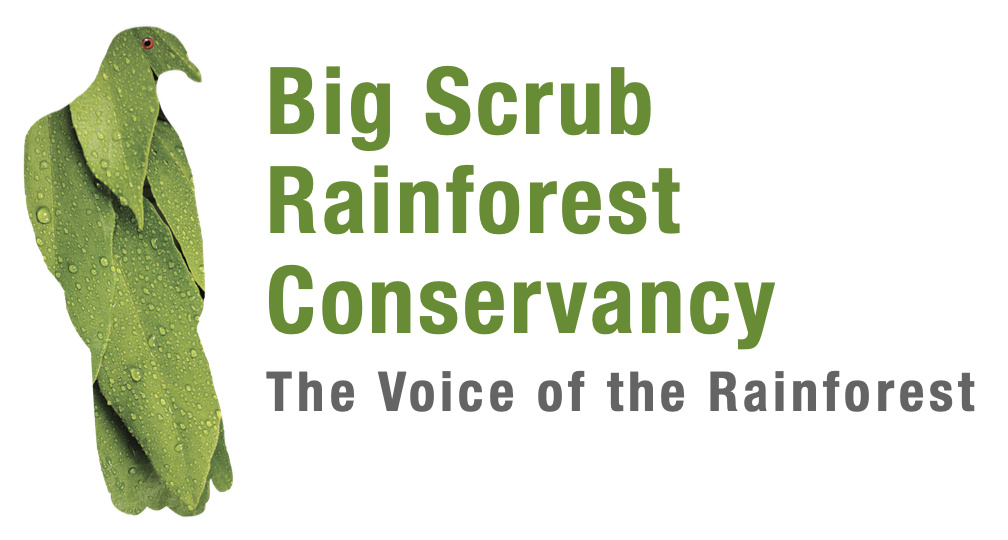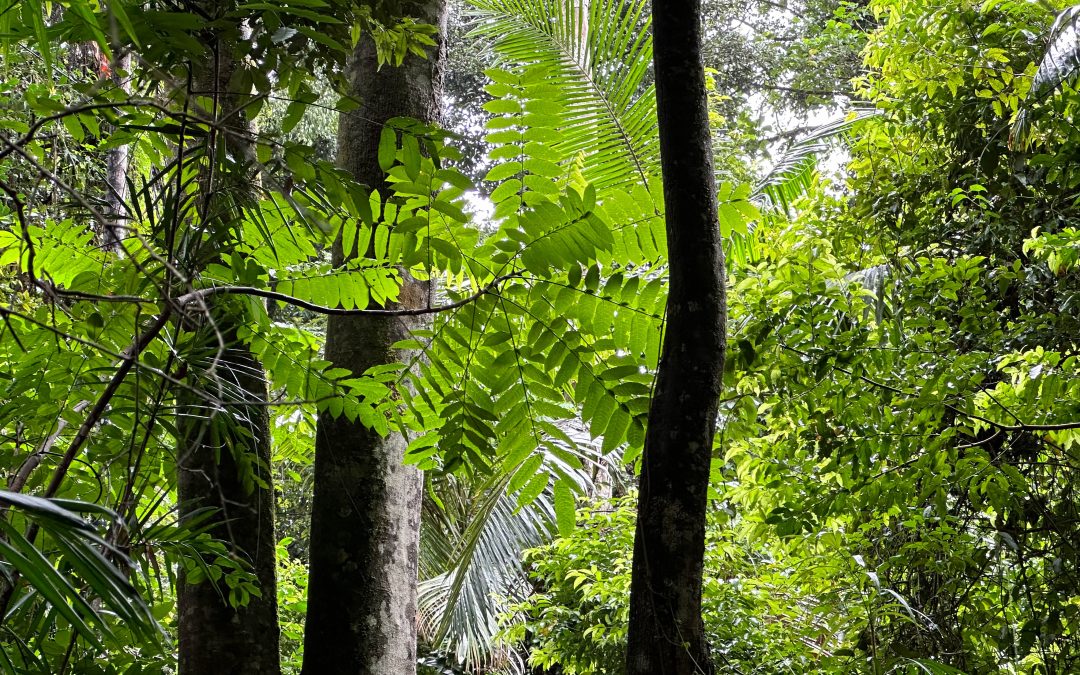By Darren Bailey.
The Booyong Flora Reserve is a unique rainforest remnant of the former Big Scrub. The rainforest occupies 13ha of low lying flats located at the junction of the Wilsons River and Pearces Creek. It is the only true riverine rainforest remnant on crown land outside the public reserve system and is managed by the Booyong Reserve Trust. The site escaped the clear felling that saw most of the Big Scrub converted to agricultural land as it was set aside as a recreation area for early settlers to the area.
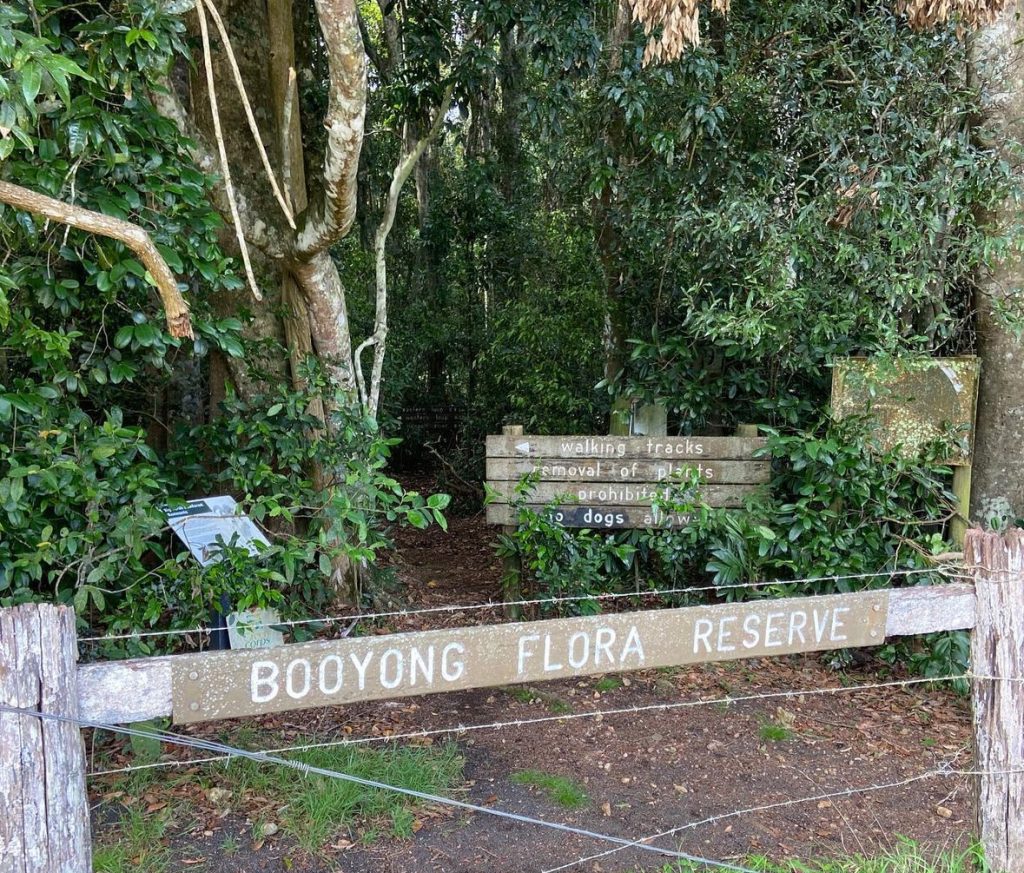
The remnant is an example of the White Booyong Sub-Alliance and supports many mature trees of White Booyong, Pepperberry, Myrtle Ebony, Red Cedar, Oliver’s Sassafras, Green-leaved Rose Walnut, Marara, Black Bean, White Beech, Koda, Black Apple, Giant Water Gum, and Small-leaved Fig. The riverbank is lined with trees such as Sandpaper Fig, Rough-leaved Elm, Red Pear-fruit, Whalebone Tree, Ball Nut, Brown Tamarind as well as endangered plants including Red Lilly Pilly, Thorny Pea, and Brush Sauropus. Booyong Reserve also contains a wide variety of vines, palms, epiphytes, ferns and other ground covers. It supports the largest known population of the endangered herb Isoglossa (Isoglossa eranthemoides) in any rainforest reserve. The reserve also supports a range of rainforest dependent birds including the Noisy Pitta, Rose-crowned Fruit-dove, Whipbird and Rufous Fantail. White-bellied Sea Eagles are regular visitors to the site and are often seen hunting Flying-foxes in the rainforest canopy. The curious Southern Angle-headed Dragon is occasionally encountered in the reserve.
The rainforest at Booyong has been passionately restored by Big Scrub Rainforest Conservancy over the last 25 years. Prior to being actively managed by the Conservancy, the rainforest contained major infestations of environmental weeds such as Cats Claw, Lantana, Madeira Vine, Trad, Cocos Palm, Ochna and Small and Large-leaved Privets. These weeds impacted on the structural integrity and overall diversity of the remnant and limited the natural ability of tree fall gaps to regenerate. With funding assistance from NSW Environmental Trust, the Saving our Species program, Big Scrub Foundation, Rainforest Rescue and thousands of hours of bush regeneration work has been undertaken at the site. Various local contractors, Green Corps teams and staff from Environmental Training and Employment contributed to the restoration of the rainforest at Booyong Reserve.


Today, the rainforests at Booyong Reserve are in very good condition and the abundance of environmental weeds is low. However ongoing inputs are required to maintain the site and prevent weeds from re-establishing. Tree falls constantly occur in the forest and subsequently new opportunities for weed growth occurs. Seasonal flooding on the river brings vegetative material of weeds such as Trad and Madeira Vine from upstream and deposits them back into the site where they begin to grow when the floodwaters recede. These weeds can quickly establish and are often difficult and time consuming to control. Wind blown seeds of Moth Vine and Cats Claw also arrive at the site and quickly grow up and onto the remnant edges. Regular follow up treatments are required around the edges of the rainforest to keep these weeds under control. Woody weeds such as Lantana, Camphor Laurel and Privet are constantly brought into the site by the activity of birds which feast on the fruits supplied by the surrounding landscape. These weeds can grow quickly along tracks and in gaps in the rainforest canopy and will rapidly compete with native plants in these situations if they are left untreated.

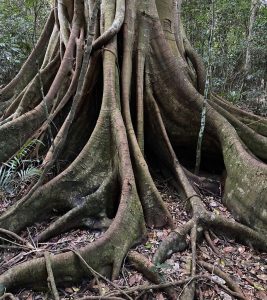
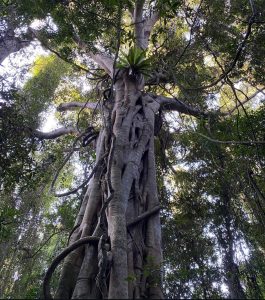
The restoration and rehabilitation of the rainforests at Booyong Reserve has been one of the greatest achievements of Big Scrub Rainforest Conservancy to date. The conservation significance and ecological values of the site are outstanding even though the reserve is merely a fragment of the original Big Scrub rainforest area. Long term support from government, community groups and local landholders will be essential to ensure that Booyong and other similar rainforest remnants survive into the future as a living testimony to the grandeur of the original Big Scrub.
